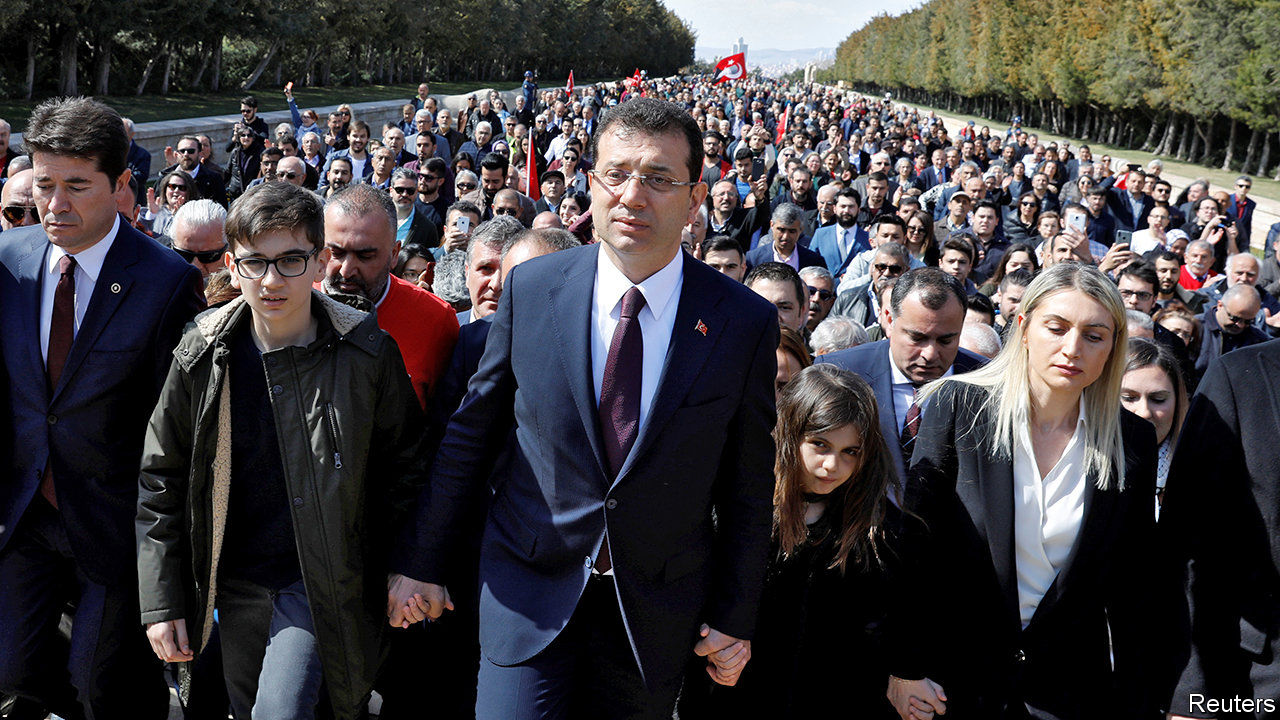
EKREM IMAMOGLU (pictured centre) could use a few hours of rest. In the wake of his unexpected win in the Istanbul mayoral race on March 31st, Mr Imamoglu says he did not sleep for three consecutive days, after the ruling Justice and Development (AK) party refused to concede and the election board ordered a recount of some 300,000 apparently invalid votes. Shortly after midnight on April 9th, the opposition’s new star cleared a big hurdle when the board denied AK’s request for a full recount. Mr Imamoglu’s success, combined with opposition victories in Turkey’s biggest cities, shows that the country’s future belongs to leaders who value respect and dialogue, Mr Imamoglu tells The Economist. “The era of using polarisation to win elections is over,” he says.
Unfortunately for Mr Imamoglu, Turkey’s president, Recep Tayyip Erdogan, has other ideas. After a week of relative silence, and once it became clear that the outcome of the Istanbul vote was not going to change, Mr Erdogan claimed the opposition had stolen the election. “There has been theft at the ballot box,” he said on April 8th. “We have detected organised crime and some organised activities.” The president then suggested a repeat election. “No one has the right to claim victory with just a 13,000 to 14,000 vote difference,” he said (in defiance of universal electoral principle), referring to the gap separating Mr Imamoglu and the AK candidate, Binali Yidlrim, a former prime minister and parliamentary speaker. The following day, after the electoral board rejected its appeal for a full recount, Mr Erdogan’s party announced it would apply to have the whole Istanbul election annulled and re-run.
In theory, given the microscopic margin of Mr Imamoglu’s victory, no one denies AK had a right to demand a recount. Yet the same right has repeatedly been denied to the opposition. In the week since the polls closed, according to a Turkish news site, electoral boards across the country have accepted 44% of appeals by Mr Imamoglu’s Republican People’s Party (CHP), 18% of those by the main Kurdish party, and a whopping 87% by AK. The double standard has persisted for some time. Turkey’s election authority rebuffed the opposition when it contested the results of a controversial referendum in 2017 and a mayoral election in Ankara in 2014, despite serious allegations of fraud.
For the time being, AK has not produced any compelling evidence of wrongdoing in the Istanbul vote, and especially of the organised crime to which Mr Erdogan has referred. “All of the voting and counting procedures were carried out with the full approval of those representing AK at the polling stations,” says Ersin Kalaycioglu, a political-science professor at Istanbul’s Sabanci University. “There are no legitimate political, ethical or legal grounds” for a repeat, he says.
Whether the election board will agree, and whether it will be able to resist pressure from the Turkish leader, remains to be seen. Yet any move by the government to strong-arm the board into cancelling the Istanbul vote risks destroying one of the last remaining pillars of Turkey’s democracy. “After this, how much trust would the opposition have in the political system?” asks Galip Dalay, a visiting fellow at the University of Oxford. “The impression this gives is that in Turkey democracy is the name of the game only as long as the government gets the results it desires.” The appeals process ends on April 13th. The board’s decision, warned the CHP’s leader, Kemal Kilicdaroglu, “will either lead Turkey to daylight or drag it into chaos.”
In addition to revealing the lengths to which Mr Erdogan might go to avoid relinquishing even some of his power, the election has revealed the depths to which Turkey’s media can sink to help him along. On the night of the vote, the state news agency stopped updating the results as soon as Mr Imamoglu began overtaking his rival. In the hours that followed, most of the main news channels refused to broadcast his press conferences. Once the fog cleared, pro-government newspapers accused the opposition of staging a coup at the ballot box.
The spectre of a repeat election, and of the tensions it might cause, has already spooked markets. The lira has weakened by over 3% against the dollar since the beginning of April. Analysts agree that the last thing Turkey’s troubled economy needs right now is another election and yet more political turmoil.
At his headquarters, Mr Imamoglu, his eyes red with fatigue, lays out his plans to cut wasteful spending by a municipality buried in over $4bn of debt, to audit its books and to dissuade Mr Erdogan from building a new canal connecting the Black and Marmara seas. He says he expects to assume office soon. “What we’re experiencing today is a test for democracy,” he says. The voters have spoken, he says, and AK needs to accept the results. He might need to prepare for yet more sleepless nights.








